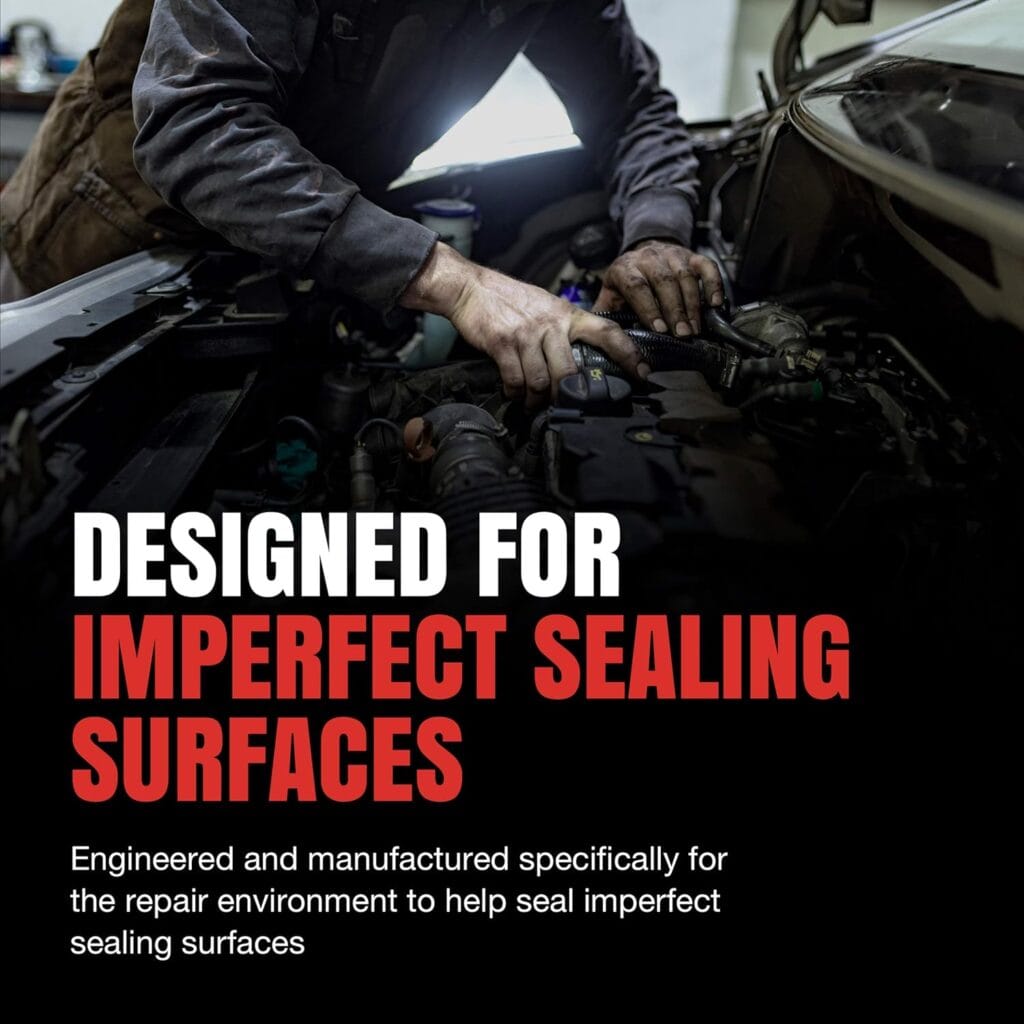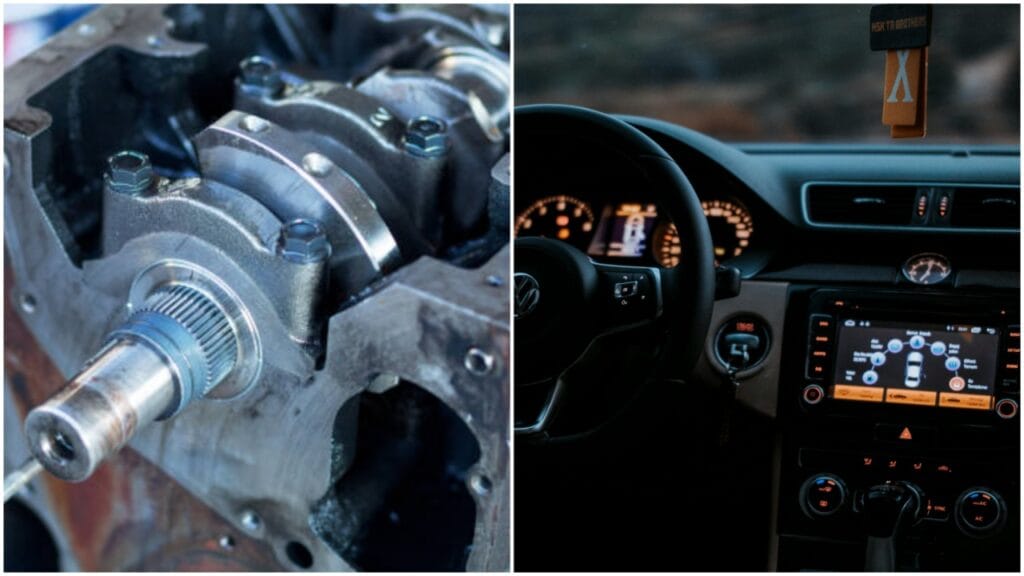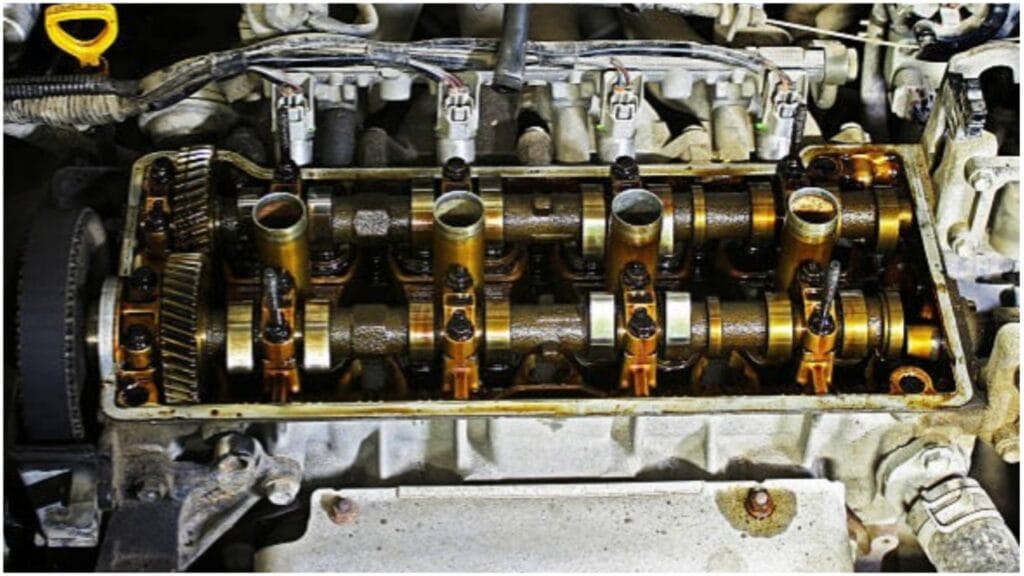Keeping your engine running smoothly isn’t just about the big parts like pistons and crankshafts. Sometimes, the small and often ignored parts play a huge role. Knowing how these parts work and what happens when they fail can save you from a lot of trouble.
A bad valve cover gasket is harmful, causing a loss of engine power. When the gasket fails, oil leaks can occur. This can drip onto spark plugs or other components. If contaminated, spark plugs may misfire, disrupting engine performance. Misfires make the engine work harder and less efficiently.
The effects of a bad valve cover gasket go deeper, messing with sensors, airflow, and fuel economy. Stick around to learn how this small part can cause big problems for your engine and learn more details.
How a Bad Valve Cover Gasket Affects Engine Performance
A bad valve cover gasket impacts engine performance indirectly. Oil leaks are the primary issue. Leaked oil can contaminate spark plugs. This causes misfires. Misfires lead to poor combustion. Less power is produced. The engine may idle roughly.
Oil can also drip onto wiring. This disrupts electrical signals. Sensors might malfunction. The oxygen sensor is vulnerable. It controls the fuel mixture. A bad signal means inefficient burning. Low oil levels from leaks increase friction. This generates more heat. Overheating can occur.
Engine components wear faster. Oil contamination can also lead to sensor damage. This results in inaccurate readings. A bad gasket can lead to a chain of problems. These problems degrade engine performance.

FEL-PRO VS 50504 R-1 Engine Valve Cover Gasket Set for Chevrolet Silverado 1500
Signs of a Bad Valve Cover Gasket
When a valve cover gasket starts to fail, your car often gives you pretty clear signs. One of the most obvious signs is an oil leak. You may notice a pool of oil under your car, or see oil dripping from the side of the engine.
Also, after the engine warms up, the cabin may smell like burning oil as the oil drips onto the hot engine parts. Visually, you will see oil residue around the valve cover, which indicates that the seal has been damaged.
We will discuss the symptoms in more detail below so that you can easily understand them. So let’s find out what the causes are.
Oil Leaks
Oil leaks are a primary indicator of a failing valve cover gasket, often appearing as puddles beneath the vehicle or streaks down the engine block. The issue arises from the gasket’s inability to maintain a seal, allowing oil to escape.
To pinpoint the problem, inspect the valve cover’s perimeter for visible oil residue and check for drips along the engine’s sides. Early detection prevents further oil loss and potential engine damage.
Overheating
While a bad valve cover gasket is not a direct cause of engine overheating, it can cause a situation that is very harmful to the engine. In particular, a gasket failure can cause oil leaks that can lead to low engine oil levels. Low oil levels reduce engine lubrication, which increases friction between moving parts.
This increased friction generates more heat, which can push engine temperatures into the overheating range. Therefore, while not a direct cause, a bad valve cover gasket can be a contributing factor to overheating.
Burning Oil Smell
A distinct burning oil smell inside your car, especially after the engine warms up, is a strong indicator of a potential valve cover gasket leak. This occurs because the leaking oil drips onto hot engine components, such as the exhaust manifold, and vaporizes.
The smell is often accompanied by wisps of smoke emanating from the engine bay. If you encounter this, it’s crucial to investigate promptly, as it signifies oil is escaping and potentially creating a fire hazard.
Visible Damage or Wear Engine
When a valve cover gasket deteriorates, it can lead to visible signs of damage or wear within the engine compartment. Upon inspection, you might observe cracks or hardening of the gasket itself, indicating its inability to maintain a proper seal.
Additionally, the surrounding engine surfaces may exhibit oil residue or grime buildup, a direct result of the leaking oil. In more severe cases, you could see oil pooling around the valve cover’s edges or even dripping onto other engine components.
Regular visual checks can help catch these signs early, preventing more extensive engine problems.
Misfires
When a valve cover gasket fails, oil can leak into the spark plug wells, leading to misfires. This oil contamination disrupts the spark plugs’ ability to ignite the fuel-air mixture, causing incomplete combustion.
Consequently, you may experience a rough idle, reduced power, or a flashing check engine light. Misfires indicate a serious issue, highlighting the need for prompt valve cover gasket repair to prevent further engine damage and restore proper combustion.
Increased Oil Consumption
A failing valve cover gasket can increase oil consumption. Oil leaks escape the engine. Low oil levels reduce lubrication. This causes more friction. Engine parts wear faster.
Some oil may burn off. Spark plugs can get oily. Oily plugs burn oil too. Check your oil level often. Fix leaks quickly. This prevents engine damage.
Oil Contamination
Oil contamination poses a significant risk when a valve cover gasket fails. Leaks allow oil to seep into areas where it shouldn’t be. Spark plugs can get coated, hindering their function. Wiring harnesses may become soaked, leading to electrical issues.
Sensors, like the oxygen sensor, can be fouled, disrupting engine management. This contamination causes misfires, rough idling, and reduced power. Promptly addressing gasket leaks prevents this damaging oil spread.
Impact of Oil Loss on Engine Power
When a valve cover gasket leaks, that vital oil starts to leak out. It’s like slowly draining the engine of power. Less oil means less lubrication, and that’s where the problems start. Metal parts rub together and create heat – which wastes power.
Also, oily spark plugs tend to misfire, like a skipping record, resulting in rough idle and loss of power. Sensors get confused by the oil, causing problems with the fuel mixture. Over time, this oil loss steals the punch from your engine, making it sluggish. There are more reasons for this, listed below.
Reduced Engine Performance
A failing valve cover gasket can subtly, yet significantly, reduce engine performance. Oil leaks lead to lower oil levels, increasing friction. This causes wear and heat. Spark plugs become contaminated, resulting in misfires and rough idling.
Sensors, like the oxygen sensor, malfunction due to oil exposure, disrupting the fuel-air mixture. The outcome is less power, sluggish acceleration, and decreased efficiency. Addressing the leak promptly restores optimal engine function and prevents further damage.
Increased Oil Consumption
Oil consumption rises when a valve cover gasket leaks. Oil escapes the engine externally. Low oil levels reduce lubrication. This increases friction. More friction means more heat. Some oil burns off.
Spark plugs get oily. Oily plugs burn oil too. It’s not just drips. The engine works harder. This extra work consumes more oil. Fix leaks fast. Monitor oil levels. Prevent engine damage.
Why Addressing Gasket Issues is Important

Ignoring a faulty valve cover gasket invites trouble. Left unchecked, oil leaks worsen. This leads to low oil levels, risking severe engine damage. Contaminated spark plugs cause persistent misfires, robbing your car of power.
Sensors malfunction, disrupting fuel efficiency. Burning oil poses a fire hazard. Plus, fixing it early is cheaper than a full engine repair. A small leak now prevents big problems later. Regular maintenance keeps your engine running smoothly and safely.
Threats to Engine Health and Efficiency
A leaking valve cover gasket silently threatens your engine’s health. Oil seeps where it shouldn’t, disrupting vital processes. Spark plugs misfire, like a skipped beat, reducing power. Sensors, crucial for fuel efficiency, become confused by oil contamination. This leads to inefficient combustion, wasting fuel.
Low oil levels increase friction, generating excessive heat. This accelerates wear and tear, shortening your engine’s lifespan. Ignoring these issues invites costly repairs and reduces your vehicle’s overall performance. Addressing gasket leaks promptly safeguards your engine’s long-term health and efficiency.
Avoiding Unexpected Breakdowns
No one wants a sudden breakdown. A failing valve cover gasket can be a sneaky culprit. Oil leaks lead to unexpected engine troubles. Low oil levels cause friction and heat, stressing engine parts. Contaminated spark plugs result in misfires and rough idling.
Sensors malfunction, affecting fuel efficiency. Addressing gasket issues early prevents these problems. Regular maintenance keeps your car running smoothly. Check for oil leaks and burning smells. Small repairs now avoid costly breakdowns later. A healthy engine means peace of mind on the road.
Solutions for a Faulty Valve Cover Gasket
A faulty valve cover gasket needs prompt action. Replace the gasket. It’s the best solution. Use quality parts. Clean any oil residue. Check for other leaks. Inspect spark plugs and wires.
Ensure proper installation. Tighten bolts correctly. Regular oil changes help. Monitor oil levels. Prevent future leaks. A well-maintained engine runs smoothly. Address issues early.
Inspection and Diagnosis Replacement
Start with a visual inspection. Look for oil leaks. Check around the valve cover’s edge. Notice any oil residue. The smell of burning oil. Look for smoke. If misfires occur, check spark plugs. Oil on plugs means a leak. Professional diagnosis is key.
A mechanic can confirm the issue. Replacement is the fix. They’ll remove the old gasket. Clean the surface. Install a new, quality gasket. Proper torque is vital. This prevents future leaks. Regular checks save trouble.
Procedures
Replacing a valve cover gasket involves several key steps. The process begins with disconnecting the battery to ensure safety. Obstructions, like air intake parts or wiring, must be removed to access the valve cover.
The cover’s bolts are detached in a specific sequence to prevent damage. Old gasket material is thoroughly cleaned from the mating surfaces. A new gasket is then positioned correctly.
The valve cover is reattached, and the bolts are tightened to specific torque values. Finally, any removed components are reinstalled, and the battery is reconnected. This procedure addresses leaks caused by a faulty gasket.
How much does a Valve Cover replacement cost?
Valve cover gasket replacement costs fluctuate, influenced by your vehicle’s make and model, labor rates, and part quality. Expect to pay between $150 and $500 on average, though luxury vehicles can push costs beyond $1,000. The gasket itself is usually a small expense, ranging from $10 to $100.
Labor, however, forms the bulk of the bill, typically between $100 and $300 or more, depending on the mechanic’s hourly rate and the engine’s complexity. To get a precise estimate, contact local repair shops, providing your vehicle’s details for an accurate quote.
Preventive Maintenance Tips

Keeping your valve cover gasket in good shape boils down to smart preventive maintenance. Regular oil changes are key. Clean oil reduces engine stress and heat, extending gasket life. Avoid engine overheating by monitoring coolant levels and addressing cooling system issues promptly.
Inspect for oil leaks regularly; catch small leaks before they worsen. Use quality oil and filters, as cheap options can degrade gaskets faster. Ensure proper engine ventilation to prevent excessive pressure buildup.
When replacing the gasket, use quality parts and ensure proper installation torque to avoid future leaks. Simple steps like these keep your engine running smoothly and prevent costly repairs.
Regular Inspections
Regular inspections are vital. Check for oil leaks often. Look around the valve cover. Spot any oil residue. Smell of burning oil. Note any smoke. Inspect spark plugs. Look for oil contamination.
Check fluid levels. Ensure proper ventilation. Early detection prevents major issues. Consistent checks save money. A healthy engine means safe driving.
Choosing Quality Replacement Parts
When replacing a valve cover gasket, quality parts are crucial. Opt for OEM or reputable aftermarket brands. Cheap gaskets often fail quickly. They may crack or leak. Quality gaskets offer a better seal.
They withstand heat and oil. They last longer. Proper fit is essential. Avoid leaks and engine damage. A good gasket ensures optimal performance. It prevents oil contamination and misfires.
Scheduling Professional Service
For valve cover gasket issues, professional service ensures accurate diagnosis and proper repair. Mechanics differentiate gasket leaks from other problems. They have tools for correct installation, preventing future leaks. They use quality parts for longevity.
Comprehensive service includes checking related components. Warranties offer peace of mind. Engine work is dangerous; professionals ensure safety. Expert service saves time and money, avoiding costly future repairs.
Related Engine Issues and Power Loss
A bad valve cover gasket isn’t the only culprit for power loss. Other engine issues can mimic its symptoms. Faulty spark plugs, for example, cause misfires, similar to oil-contaminated plugs.
Clogged air filters restrict airflow, reducing combustion efficiency. Fuel system problems, like a failing fuel pump or injectors, disrupt the fuel-air mixture. A clogged catalytic converter restricts exhaust flow, hindering engine performance.
Damaged sensors, such as the mass airflow sensor or oxygen sensor, provide inaccurate readings, leading to poor combustion. Identifying the root cause requires thorough diagnostics. A mechanic can differentiate between gasket-related issues and other engine malfunctions.
The Link Between a Bad Valve Cover Gasket and Power Loss
While a bad valve cover gasket doesn’t directly cause power loss, it sets off a chain reaction. Leaking oil contaminates spark plugs. This leads to misfires. Misfires mean incomplete combustion.
Less combustion equals less power. Oil can also damage wiring. This disrupts sensor signals. Faulty signals affect the fuel mixture. An incorrect mixture reduces engine efficiency.
Low oil levels, due to leaks, increase friction. This creates heat and wear. Engine efficiency drops. Essentially, the gasket leak triggers related problems, each contributing to a noticeable decrease in engine performance.
FAQ’s
Engine damage from overheating
Engine overheating causes severe damage. High temperatures can warp or crack the cylinder head, leading to a blown head gasket. This allows coolant and oil to mix, causing lubrication failure. Pistons can expand and scuff cylinders.
The entire engine block might crack. Overheated oil loses effectiveness, damaging bearings. This leads to reduced power, knocking, and eventually, complete engine seizure. Immediate action is crucial to prevent costly, irreversible harm.
Are valve covor leak bad
Yes, valve cover leaks are bad. Even small leaks cause oil loss. This can lead to dangerously low oil levels, harming engine components due to insufficient lubrication. Oil can also drip onto hot exhaust parts, creating a burning smell or even a fire risk.
Leaks might contaminate spark plugs, causing misfires and rough running. Address valve cover leaks promptly to prevent more costly engine damage.
Can a misfire cause overheating
Yes, a misfire can cause overheating. When a cylinder misfires, unburned fuel enters the exhaust system. This raw fuel then ignites in the catalytic converter, causing it to dangerously overheat.
This excessive heat can then transfer back to the engine, leading to overall overheating. Misfires also mean incomplete combustion, making the engine work harder and generate more heat.
Engine oil spill burn time
The time it takes for spilled engine oil to burn off on hot surfaces varies. Factors include the amount spilled, engine temperature, and airflow. Small drips on a hot exhaust manifold might burn off in minutes, often producing smoke and a burning smell.
Larger puddles, or oil in cooler areas, can take much longer, sometimes days of driving, to fully evaporate or burn. Always clean spills quickly to prevent fire hazards and persistent odors.
If your car needs new gaskets can that cause the engine to lose power when you’re driving?
Yes, absolutely. Leaking gaskets can significantly cause power loss. A blown head gasket allows coolant or oil into the cylinders, reducing compression and misfiring. This directly robs power.
An exhaust manifold gasket leak can disrupt exhaust gas flow, affecting oxygen sensor readings and engine performance. Intake manifold leaks cause vacuum issues, leaning the air-fuel mixture. All these lead to reduced engine efficiency and noticeable power loss while driving.
Can a Bad Valve Cover Gasket Cause Oil to be Burned?
While a bad valve cover gasket primarily leads to external oil leaks, it can indirectly contribute to oil burning. The gasket’s failure allows oil to escape and potentially drip onto hot engine components like the exhaust manifold.
This contact causes the oil to burn off, producing a distinct burning smell and sometimes smoke. However, this is not internal oil consumption. More directly, if the oil leaks into the spark plug tubes, that oil can be burned off in the combustion process.
Furthermore, persistent leaks can lower the overall oil level in the engine. Reduced lubrication increases friction, leading to higher engine temperatures and accelerated wear, which can, in severe cases, cause some oil to burn off inside the engine.
It’s crucial to distinguish between external oil burning due to leaks and internal oil consumption caused by issues like worn piston rings or valve stem seals. While a bad gasket is not the direct cause of internal oil burning, it can be a contributing factor.
Does a bad valve cover gasket affect performance?
Yes, a bad valve cover gasket can affect your car’s performance. When the gasket fails, it allows oil to leak, which can lead to a variety of issues. For starters, oil can drip onto spark plugs, causing misfires.
Misfires disrupt the engine’s smooth operation, leading to rough idling, reduced power, and poor acceleration. Additionally, oil leaks can mess with compression, lowering the engine’s efficiency and causing a loss of power.
Can a bad valve cover gasket cause bad gas mileage?
A bad valve cover gasket can hurt your gas mileage, but it’s not a direct cause. The gasket seals the top of your engine, keeping oil from leaking out. Oil can seep into other parts, like the spark plugs if it fails. When spark plugs get oily, they don’t work as well.
This can make your engine run rough or less efficiently, which might lead to worse fuel economy. Also, an oil leak means your engine might not get enough lubrication, causing it to work harder. Harder work means more fuel burned.
So while the gasket doesn’t touch your fuel, its failure creates a chain reaction. It’s a simple fix but ignoring it can snowball into bigger problems.
Can valve cover gasket cause overheating?
A bad valve cover gasket usually doesn’t cause overheating directly. Its job is to seal the engine and prevent oil leaks. But if the gasket fails, oil can leak onto hot engine parts like the exhaust manifold.
This can create smoke and a burning smell, which might seem overheating. If too much oil leaks, the engine could lose lubrication. Lack of oil makes the engine work harder and run hotter. Over time, this can lead to overheating.
In rare cases, leaks near critical components might mess with temperature sensors or cooling parts. While a bad gasket isn’t the main cause, it can start a chain of problems leading to overheating. Fixing it quickly can save you trouble.
Can a vacuum leak cause a misfire?
Yes, a vacuum leak can cause a misfire. It happens because the air-fuel mixture in the engine becomes unbalanced.
A vacuum leak allows extra air to enter, throwing off the proper mix and leading to uneven combustion in the cylinders.
Misfires occur when one or more cylinders fail to ignite the fuel properly. The engine might feel rough, lose power, or even stall.
A vacuum leak can come from cracked hoses, a faulty intake manifold, or a broken gasket. The engine sensors struggle to keep up with the unexpected air, worsening the problem.
This issue can trigger the check engine light and store error codes. Fixing a vacuum leak usually involves finding and sealing the leak.
Cleaning or replacing parts like hoses or gaskets is needed. Ignoring a vacuum leak can damage the engine over time. So, if your car misfires and feels off, check for leaks first.
Will a leaking valve cover gasket cause loss of horsepower?
Yes, a leaking valve cover gasket can cause a loss of horsepower. Oil escapes from the gasket and leaks onto engine components, reducing lubrication and creating extra friction. As a result, the engine struggles to perform efficiently.
Oil leaks can cause issues like dirty spark plugs or fouled ignition coils. These problems disrupt combustion, leading to reduced power. Over time, the leaking oil may damage sensors or belts, worsening the engine’s performance.
A leaking gasket doesn’t just waste oil; it strains the engine. If left unchecked, it can cause overheating or even more severe damage. You might notice symptoms like a burning oil smell, visible oil leaks, or poor acceleration.
Fixing a valve cover gasket leak is crucial for maintaining horsepower. Replacing the gasket and cleaning up any spilled oil can restore engine efficiency. Regular maintenance helps prevent such leaks from developing.
Conclusion
A bad valve cover gasket may not attract attention, but it’s a problem that can lead to bigger problems if ignored. From oil leaks to spark plug problems and even engine misfires, it can affect your car’s performance in ways you might not notice at first.
Taking care of this small part can save you from bigger and more expensive problems in the future. Regular maintenance and prompt gasket replacement aren’t just about fixing leaks – they’re about keeping your engine running smoothly and efficiently. So, keep an eye on your gaskets and avoid the hassle of major repairs later!

